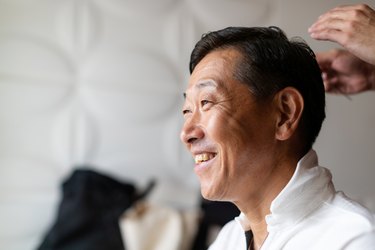
You probably know that voice shifts and puberty go hand in hand. But it's also not uncommon for older adults to experience vocal changes, and there's even a medial term for it: presbyphonia.
Somewhere around age 60, many people start to notice their voice doesn't sound quite the same as it used to. These shifts, which tend to be gradual, can make your voice sound higher or lower, cause it to be hoarse or shaky, or make it harder to speak loudly or for long stretches, explains Sarah Awde, an Ontario-based speech-language pathologist who works with older adults.
Video of the Day
Video of the Day
Developing an "older" sounding voice isn't uncommon, and often, it's simply part of the process of aging. Other times, vocal shifts can happen alongside hormonal changes or, in some cases, certain health problems.
3 Ways Your Voice Changes as You Age
Wondering what, exactly, could be causing your voice to veer into unfamiliar territory? Here are three of the most common causes.
1. Your Voice Box Becomes Weaker and Drier
The body slowly loses muscle mass and tone as we get older, including in your vocal cords or folds — the two bands of muscle in the voice box that vibrate to produce vocal sounds, Awde explains. This can cause the folds to become weaker and less flexible, making it harder for them to open and close efficiently.
At the same time, the natural mucus coating on the vocal folds can start to diminish, causing them to become drier. "The vocal folds rely on this mucus coating in order to vibrate smoothly and effectively to produce a good sound," Awde says.
The result: presbyphonia.
2. Hormonal Shifts Can Factor In Too
After menopause, declines in the hormone estrogen can cause women's voices to become deeper, Awde says. In fact, nearly half of postmenopausal women experience vocal changes, which are often accompanied by dry throat, according to an August 2017 study in the Journal of Menopausal Medicine.
Hormone changes can affect older men too. As production of the hormone testosterone naturally drops, "men's voices can become breathier and higher in pitch," says Awde.
3. Certain Health Conditions Can Affect Your Voice
Problems like Parkinson's disease, which tend to be more common in older adults, can have a significant affect on voice. "People with PD often experience changes to voice quality as well as a decline in vocal amplitude," Awde says. "Voice can often become flat or robotic sounding with less melody or intonation."
This isn't necessarily due to vocal cord changes, though. Instead, it's related to faulty feedback loops in the brain. "The person with PD thinks they are speaking loudly when they are not, due to the brain giving false information," Awde explains.
There are other culprits too. Other neurological problems like multiple sclerosis, unmanaged GERD and the development of vocal polyps or cancerous lesions can also cause a person's voice to change, according to the National Institute on Deafness and Other Communication Disorders (NIDCD).
A minor and gradual change to your voice as you get older likely isn't cause for concern. But if you're unhappy with your new sound or it's making it harder for you to communicate effectively, you've got options.
1. Maintain Good Vocal Hygiene
Get into the habit of giving your vocal cords a little TLC. "Staying adequately hydrated, using a humidifier to ensure the vocal cords are lubricated and avoiding abusive vocal habits like constant throat-clearing can be extremely helpful," Awde says.
Also, try not to shout or speak loudly for extended periods — it strains and stresses your vocal cords, the NIDCD says.
2. Consider Voice Therapy
A speech pathologist or voice therapist can teach you exercises to improve your vocal technique, which can help with problems like volume, voice quality and endurance. Awde recommends finding a speech pathologist with experience in treating presbyphonia.
"There's a specific voice therapy called PhoRTE that's specifically for the aging voice," she says.
3. Ask About Vocal Cord Augmentation
If voice therapy isn't doing enough, your doctor may recommend vocal cord augmentation, where filler is injected into the vocal cords. This procedure, which is usually performed in-office under local anesthesia, straightens the vocal cords and can make it easier for them to fully close, per Johns Hopkins Medicine.
When to See a Doctor About Voice Changes
Normal age-related voice changes tend to be gradual, so if you notice a quick shift, that could signal an underlying health problem. "If a sudden or rapid change in voicing occurs, there could be something else at play," Awde says. In that case: "It's important to seek out a consultation with an ear, nose and throat (ENT) doctor."
- Journal of Menopausal Medicine: "Vocal Symptoms and Acoustic Findings in Menopausal Women in Comparison to Pre-menopause Women with Body Mass Index as a Confounding Variable"
- National Institute on Deafness and Other Communication Disorders: "Taking Care of Your Voice"
- Johns Hopkins Medicine: "Presbylaryngis (Vocal Fold Atrophy)"
Is this an emergency? If you are experiencing serious medical symptoms, please see the National Library of Medicine’s list of signs you need emergency medical attention or call 911.


